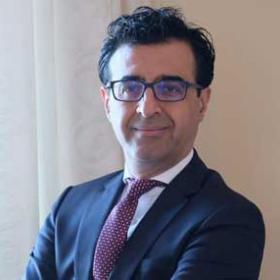
Hassan on the Fall of Raqqa and the Future of ISIS
On October 19, Kawa Hassan, director of EWI's Middle East and North Africa Program, gave an interview with Saut Al Hadath—a joint radio program of Deutsche Welle Arabic Service and Radio Voice Lebanon—commenting on the fall of Raqqa, the future of ISIS and post-ISIS Syria.
An English translation of the intervew follows, bellow:
Question (Q) 1: Militarily, ISIS is collapsing dramatically in Syria and Iraq. What will be ISIS’s next strategy? Will it return to traditional terror tactics or will it move to other areas in the MENA region and declare a "new Caliphate?"
Kawa Hassan (KH): Indeed, ISIS is facing big military defeats in Iraq, Syria and Libya. But, ISIS is a very flexible and adaptive organization. More importantly, ISIS is a symptom of underlying political, social and geopolitical long-standing problems in the MENA region. Decades of authoritarian state leadership resulted in failed states in Syria, Iraq, Libya and elsewhere, which, in turn, has led to the birth of this ruthless, terrorist organization. Despite these setbacks, ISIS is not fully defeated militarily, let alone ideologically; it will disappear for a while and then resurface. ISIS will likely retreat into the desert or into internally displaced person camps until a conducive local, national and regional context will enable it to resume its terrorist rein.
Q2: For the first time since declaring the Caliphate, in 2014, ISIS has not posted any publications regarding its rule, governance, provision of services or “da’wah” (Islamic preaching). Does this silence represent an end of ISIS governance?
KH: True, the losses in the battlefields considerably impacted ISIS’s military, organizational and media capabilities. This pertains to the fact that ISIS is facing multiple military, national, regional and international coalitions led by the U.S., Russia and others. As a result, ISIS has turned to alternative propaganda means: inciting the so called "lone wolves," staging non-conventional attacks like the one in Tehran (on June 7, 2017]. ISIS wants to show its supporters that it is capable of striking at will, wherever it chooses.
Q3: ISIS has depended on its ideology to recruit local and foreign fighters. Despite recent military defeats, ISIS's ideology is still present. What are the reasons for this [ideological resilience]? Has it to do [for instance] with certain religious texts [used by ISIS to inspire mobilization] or are there other reasons?
KH: ISIS has lost the territorial fight but not the ideological battle for a very simple reason: lack of an alternative ideology. The failure of Syria, Iraq, Libya, Yemen, regional states and international powers to produce political pacts and systems that are accountable to the population—inclusive, uncorrupted and respectful of human rights and the dignity of citizens—has produced ISIS. As long as there is no credible ideological alternative, ISIS's ideology will remain and potentially grow stronger.
Q4: Following the military defeats of ISIS, do you foresee a different focus in international policy towards the root causes of terrorism?
KH: So far, I do not see any [serious attempt] to go beyond the military defeat of ISIS. This is clearly the approach of the US-led Global Coalition against ISIS [and other “coalitions”]. Look at the recent military clashes between Iraqi forces and Kurdish Peshmerga in Kirkuk, Iraq. Both sides cooperated in the fight against ISIS. But, due to the absence of a political plan to address the long-standing differences between both sides, clashes erupted between them [triggered by the Kurdish referendum]. In short, the "War on Terror" did not defeat terrorism. This will not happen until there is a new, comprehensive approach to tackle the root causes that led to the rise of ISIS and similar ideological movements. For instance, it does not appear that a post-ISIS Syria would be better off than present-day Syria. Statistics from the Syrian Civil War are simply staggering: one third of Syria’s populations are refugees and internally displaced persons, hundreds of thousands have been killed and more than 200,000 people have been detained. The extent of destruction—politically, economically and socially—in Iraq and Syria is perplexing. So far, there is no "Marshal Plan" to rebuild these destroyed states and societies.
Q5: Why does the West not have a "Marshal Plan," like the one it implemented in post-war Europe, for the reconstruction of Syria and Iraq?
KH: This is a very good question. Indeed, I mentioned "Marshal Plan," but I must highlight the differences between both contexts. In the case of post-war Europe, the war ended with clear-cut winners and losers. The Cold War, between the West and the East, characterized the post-war international system ideology. This is not the case in today’s Middle East. Some of the popular uprisings of 2011 were crushed violently by authoritarian regimes [and radical groups such as Al-Qaeda, ISIS, and the like]. The West is busy with its own political and economic problems and not interested in a “Marshal Plan” for the Middle East. The election of President Trump is an excellent example [of U.S. isolationism and lack of interest in leading the reconstruction in the Middle East]. Europe is busy with its own structural problems. The countries in the Middle East are undergoing profound, complex transformations and transitions—in some cases, very violent and bloody—while the West is preoccupied with its own political and economic crises. This is why international powers choose the narrow, military approach to defeat ISIS without trying to develop and implement alternative narratives and policies.
Click here to watch the full interview.
Photo credit: "Ar Raqqa" (CC BY 2.0) by Beshr Abdulhadi

